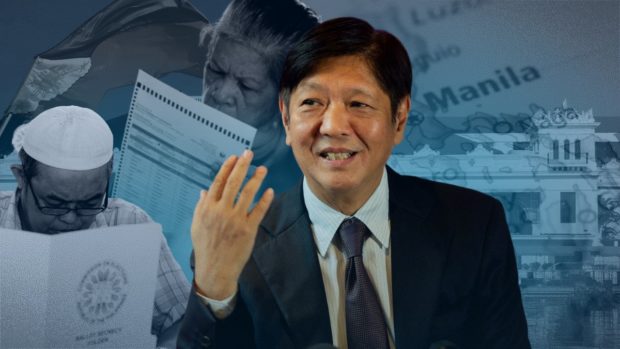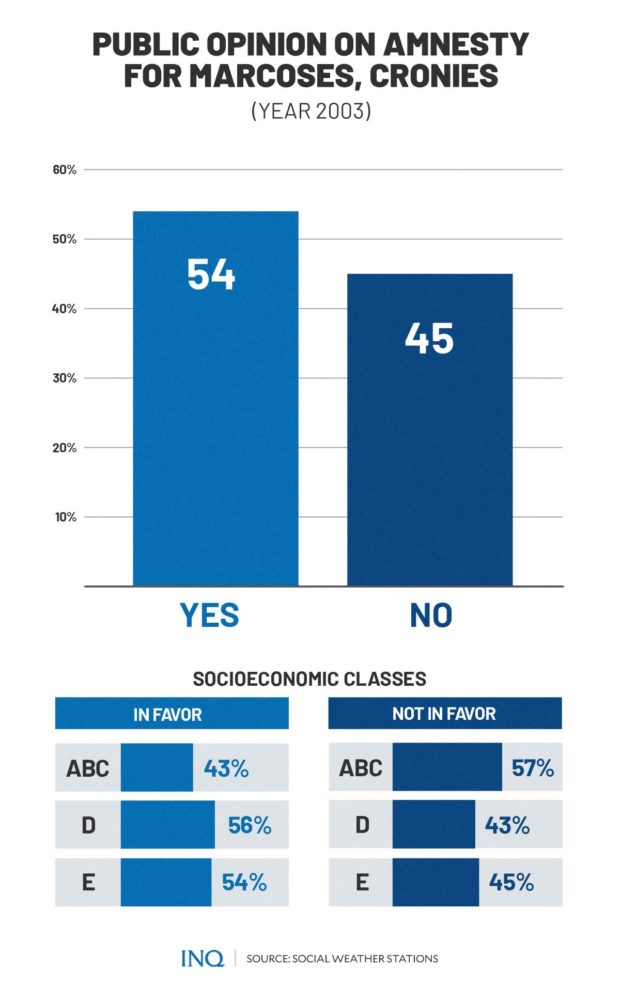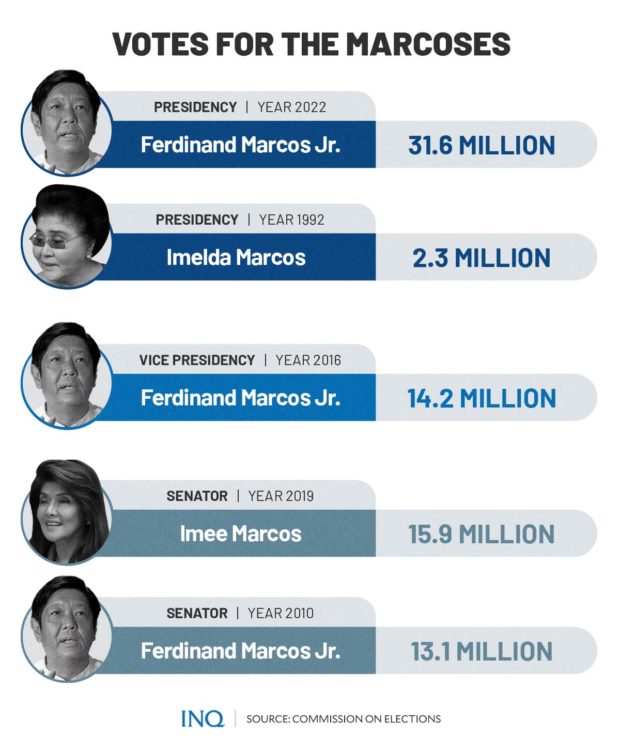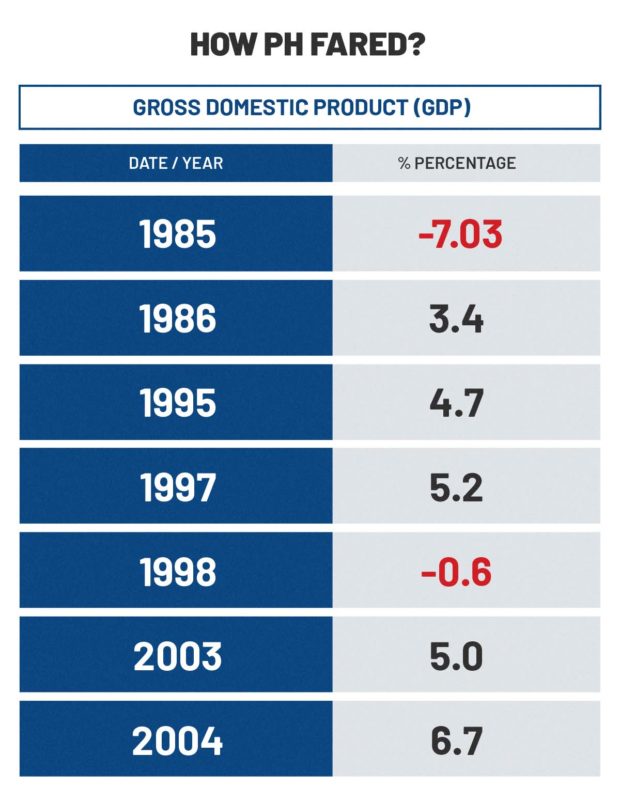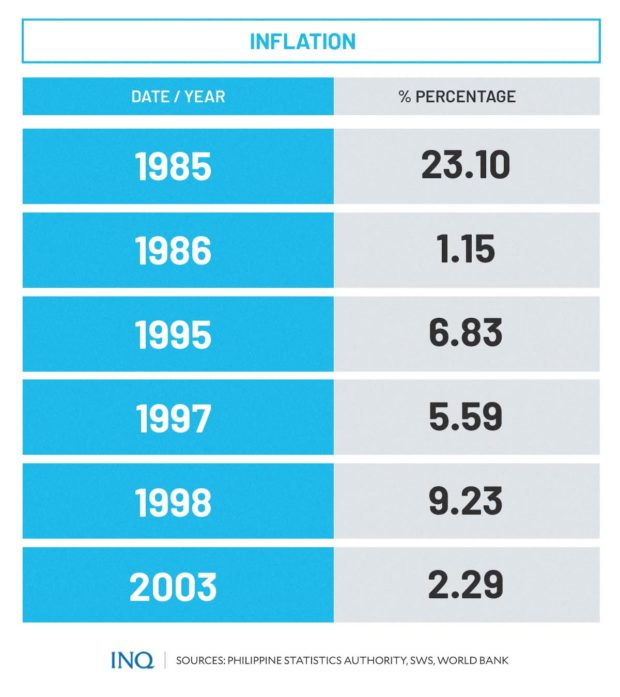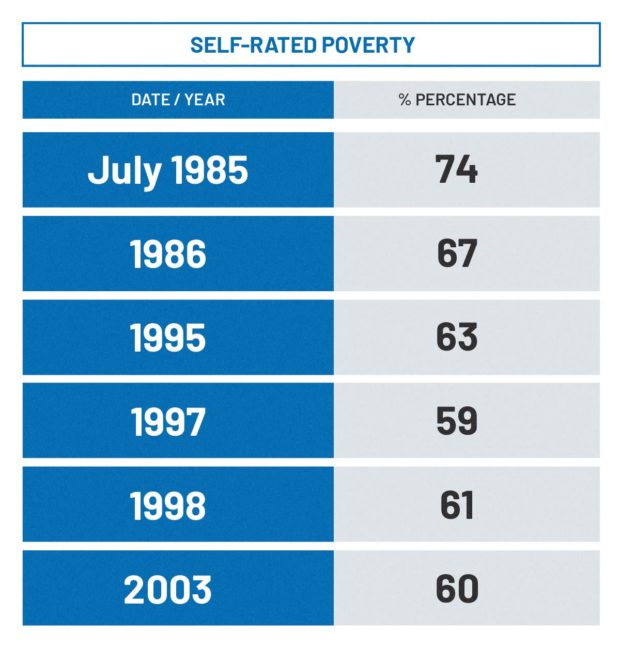Writing on the wall barely noticed: Old surveys showed public opinion tilting in Marcoses’ favor
MANILA, Philippines—“You, the people, have spoken. By your vote, you rejected the politics of division.”
These were some of the words of Ferdinand Marcos Jr. on Thursday (June 30) in a speech following his inauguration as the Philippines’ 17th president.
READ: It’s official: Bongbong Marcos sworn in as PH’s 17th President
“I am here not to talk about the past. I am here to tell you about our future,” he said.
That views on the Marcos family shifted dramatically more than 36 years after the late strongman Ferdinand Marcos was ousted from power could have been predicted by results of past surveys on people’s opinion about the Marcoses.
The change in opinion, as mirrored by results of the survey mainly by the polling firm Social Weather Stations (SWS), has not yet factored in the promises of Marcos Jr.
“A future of sufficiency, even plenty of readily available ways and means to get done what needs doing by you, by me. We do not look back, but ahead,” he said in his inaugural speech.
Franz Imperial, who headed one committee for the inauguration, described the ceremony as “solemn and simple.”
It was a stark contrast, however, to the inauguration held for the late strongman Marcos in 1986, just hours before he and his family fled as a bloodless people power revolt was starting to reach the doorsteps of Malacañang, the seat of power.
RELATED STORY: Marcos’ martial law: Golden age for corruption, abuses
Public opinion then was heavily stacked against the Marcoses.
In a survey conducted in May 1986, just two months after Marcos’ ouster, SWS said 51 percent of Filipinos agreed with the statement that the late strongman, during his 21-year rule, had stolen billions of government funds.
In the same survey, SWS said, the share of Filipinos believing strongman rule was “brutal and oppressive” under Marcos was equally divided—44 percent agreeing and 44 percent disagreeing.
Surveys also by SWS in October 1995 and July 1998—after former first lady Imelda Marcos returned to the Philippines in 1991 and the remains of Marcos were brought back in 1993—mirrored similar results.
The October 1995 SWS survey said 48 percent agreed and 49 percent disagreed with the statement that Marcos was corrupt. In the July 1998 survey, the share of Filipinos disagreeing with that statement went up to 52 percent while 47 percent still held the belief that he was corrupt.
In another SWS survey, the share of Filipinos disagreeing with the statement that Marcos was oppressive shot up to 60 percent with only 38 percent agreeing. In 1998, SWS said, 51 percent disagreed with the statement that the Marcos reign was oppressive while only 41 percent agreed.
Over 20 years later, if the votes—31.6 million—received by Marcos Jr. last May 9 were any indication, Filipinos’ perception of the Marcoses has indeed “softened”. As Sen. Imee Marcos said in 2018, “we don’t need to keep hating for a very long time.”
All for ‘reconciliation, unity’
The SWS conducted a survey from August to September in 2003 to ask whether Filipinos would favor the grant of amnesty to the Marcoses and their cronies. Back then, 54 percent said “yes” while 45 percent said “no”.
The SWS question then, which was answered by 1,200 respondents, was this: “In the interest of reconciliation and unity, would you favor granting amnesty to the Marcos family and their cronies?”
Out of the 54 percent who said “yes,” 43 percent were from class ABC, 56 percent were from class D, while 54 percent were from class E. Out of those who said “no,” 57 percent were from class ABC, 43 percent were from class D, while 45 percent were from class E.
Looking back, when the late strongman’s wife, Imelda, ran for president in 1992, even if she withdrew from the race a few weeks before the elections, she still received 2.3 million votes.
It was in 2010 when Marcos Jr. ran for senator. He won a seat then as he received 13.1 million votes. Six years later, he launched a bid for the vice presidency. Although with 14.2 million votes, he lost to Robredo.
His sister, Imee, after governing the province of Ilocos Norte for nine years as governor, won a seat in the Senate in 2019. She received 15.9 million votes in the elections then.
This, even if in 2016, the SWS said that 44 percent of Filipinos agreed that there was oppression when the late Marcos declared martial law in 1972 until he was ousted from Malacañang in 1986.
Some 20 percent said they strongly agree while 24 percent said they somewhat agree. There was 11 percent who strongly disagreed while 19 percent of the respondents were undecided.
SWS said from 1986 to 1998, Filipinos’ perception of the late Marcos with regard to corruption allegations shifted from unfavorable to neutral. With regard to oppression, opinion shifted from neutral to favorable.
Leaving the past behind?
There was no explanation on why perception about the Marcos family has “softened” through the years. Critics said the Marcoses, since they went back home in 1991, have engaged in a bid to restore the family’s image.
University of the Philippines (UP) Prof. Danilo Arao, convenor of election watchdog Kontra Daya, told INQUIRER.net last February that when the Marcoses returned to the Philippines, there was no “sorry” for excesses committed.
He said that without clear recognition of the past and with an appeal to “give us a chance,” the Marcoses successfully paved the way for their political comeback, especially to the seat of power.
But Dr. Froilan Calilung, a political science professor at the University of Santo Tomas, told government network PTV-4 last May that Marcos Jr.’s massive lead in the elections was because of his “simple” message of unity.
READ: Up to last day of campaign, Bongbong Marcos sticks to unity message
He said Filipinos got “sick and tired” of the divisiveness that has defined politics in the Philippines for a “very, very long time”. He said, “In the midst of this, the message of unity from Marcos Jr. came.”
For instance, 60-year-old construction worker Florencio Collado told INQUIRER.net that he voted for Marcos Jr. on May 9 because “nothing much has changed” since the year the dictatorship came to an end.
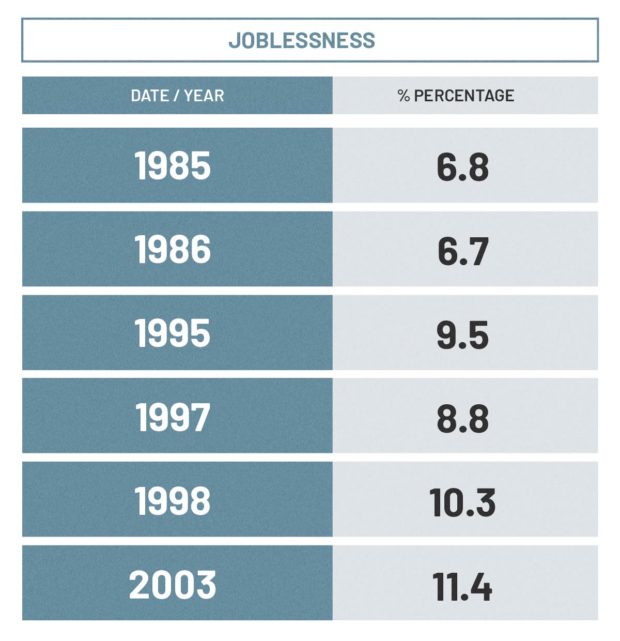
SWS said that self-rated poverty in 1985 was 74 percent. While it went down to 67 percent in 1986 and 59 percent in 1997, 60 percent of Filipinos still felt “poor” in 2003. In the last three months of 2021, 43 percent considered themselves “poor”.
RELATED STORY: In oozing praise of Duterte as ‘best president,’ Bato didn’t show numbers
Joblessness likewise went higher from 6.8 percent in 1985, 6.7 percent in 1986, 9.5 percent in 1995, 8.8 percent in 1997, 10.3 percent in 1998, to hit 11.4 percent in 2003.
Inflation in the Philippines significantly dropped from 23.10 percent in 1985 to 2.29 percent in 2003, but the Philippine Statistics Authority said that inflation rose to 5.4 percent in May this year.
Promises to reality?
Now that Marcos Jr. had already taken his oath as president, given the high expectations of those who voted for him, Prof. Maria Ela Atienza, of UP’s Department of Political Science, said he should work hard.
“[He] should actually work hard to improve the lives of people and avoid the mistakes of his father. He should actually work on healing the deep divide in the country,” she told INQUIRER.net.
However, she said that “this would entail admitting the abuses and mistakes of his father, returning the ill-gotten wealth and paying all taxes due to the Philippine government, and asking forgiveness.”
Assistant Prof. Sol Iglesias, who also teaches political science in UP, said that what any government would need to address is the massive economic and social impact of the COVID-19 crisis while expertly managing the continuing public health crisis, on top of the effects of Russia’s invasion of Ukraine.
“President Marcos Jr. today needs to govern responsibly in order to deal with the serious economic and governance problems he has inherited,” Iglesias told INQUIRER.net.
Marcos Jr. said in his address that as the chief executive, he is ready for the task ahead, with a promise to “get it done,” no excuses. He said he will not take lightly his new role as a public servant who will enable changes that would benefit everyone.
READ: Bongbong Marcos’ very first commitment as president: ‘I’ll get it done, no excuses from me’
But Atienza stressed that based on his appointment of some personalities linked with both his father and Duterte, “it looks like he will not deliver a more accountable and inclusive administration and will likely continue Duterte’s policies and programs.”
Marcos Jr. said he heard Filipinos’ call for unity, but Iglesias warned that “there is no genuine unity going forward without truth.”
“The Philippines also requires significant political reform, in particular the anti-dynasty law, but it is highly doubtful whether Marcos Jr. or Congress will have any incentive to push through any of the necessary changes,” she said.
TSB
